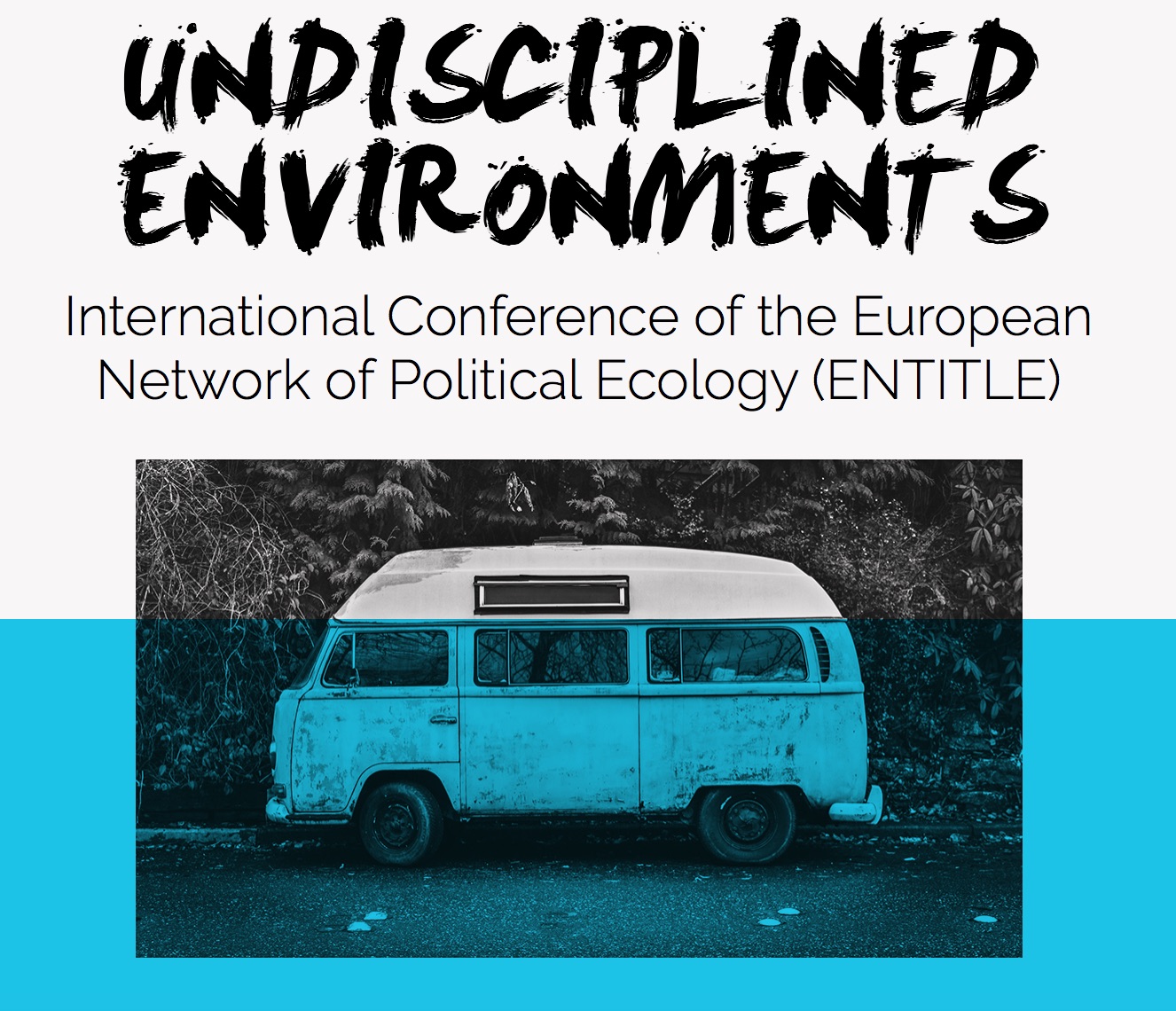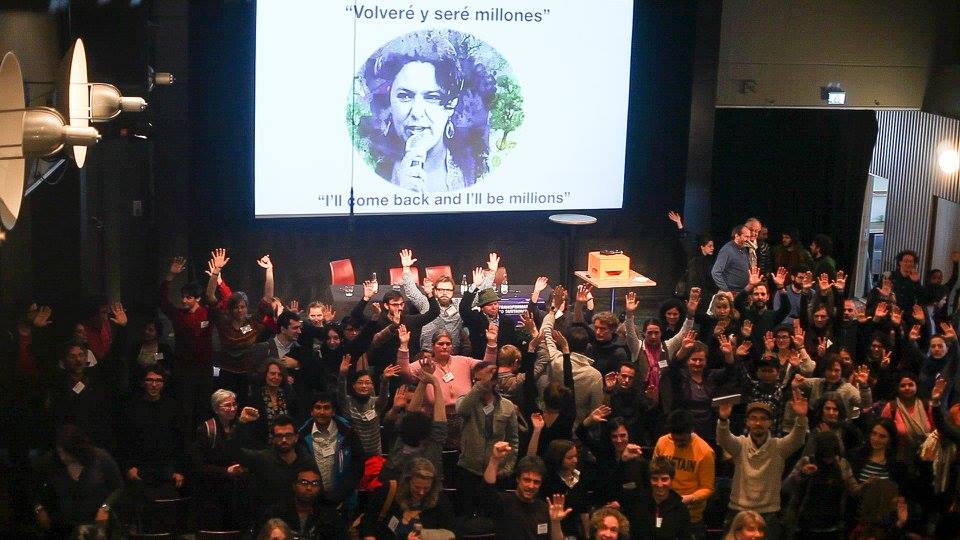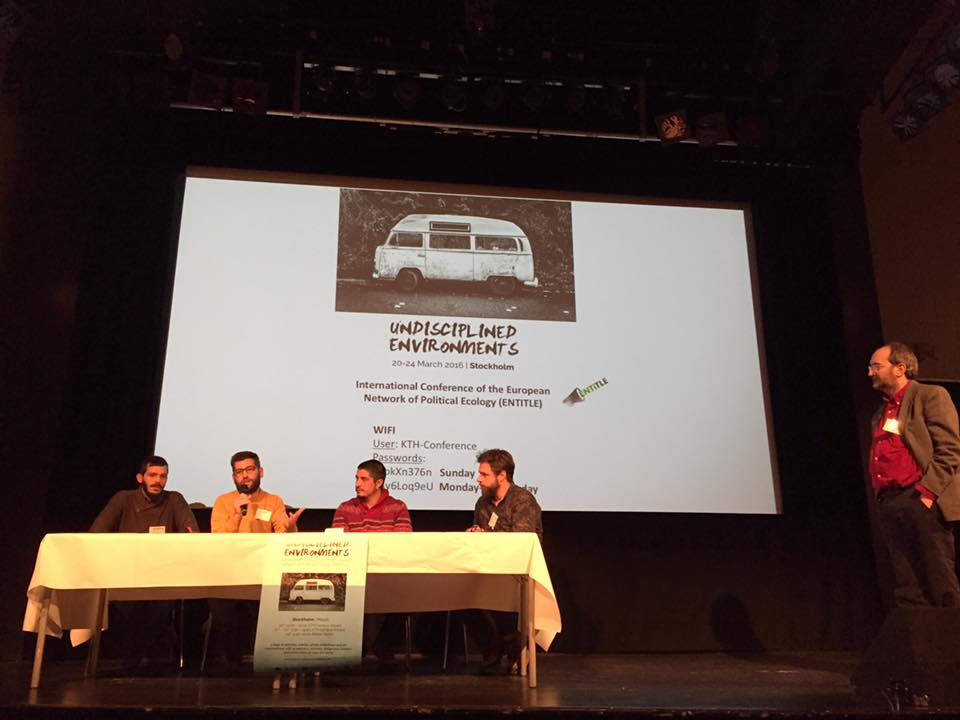Undisciplined Environments
For 4 days, from the 20th to the 24th of March 2016, about 500 people among scholars, activists, and artists convened in Stockholm for Undisciplined Environments, the International Conference of the European Network of Political Ecology (ENTITLE).

Why “undisciplined environments”? Shouldn’t society aim to discipline, control, and contain nature? Historically, this has been the main strategy through which humans have related to nature. Even more, nature has been thought through disciplines, each of them revealing as much as occluding parts of it. According to several scholars, the roots of the current ecological crisis lay precisely in the Judeo-Christian obsession to dominate nature. Although there is a continuous appeal to multi-disciplinary research and training, the ways in which knowledge is created and reproduced is deeply disciplinary/disciplined. This approach is radically inadequate to the ecological challenges our societies are facing. The environments are intrinsically undisciplined, they do not obey to humans’ desires while resisting to narrow disciplinary understandings. Also scholars can be undisciplined when they challenge mainstream paths experimenting with new practices of research and knowledge production and reproduction.
In the last decades we have seen the raising of original fields of studies which go beyond a narrow disciplinary practice. Political ecology and environmental humanities are the perfect examples of post-disciplinary environments. They are not disciplines but rather arenas where scholars from different disciplines have found a common ground for discussion. The conference Undisciplined environments spurs precisely from the confluence between political ecology and environmental humanities. It has mobilized scholars, artists, practitioners, and activists around three main themes which are key in addressing the current ecological crisis: indigenous rights, colonialism, and extractivism (Decolonial Political Ecology); social, economic, and ecological alternative to capitalism (Post-Capitalist Ecologies); and the tension between enclosing and commoning in the making of socio-ecological relationships (Enclosures vs. Commoning). Being undisciplined, this conference had the ambition to reach a wider audience than the usual scholarly community interested in this kind of events. For this reason, the conference included a variety of events: scholarly panels, arts exhibitions and interventions, a film festival, and an activists’ forum.
The conference was also the closing event of an European Union funded training program (www.politicalecology.eu) but hopefully the starting point of new research and training projects for which the conference has acted as an incubator (there were workshops specifically dedicated to foster future collaborations).
Scientific purpose of the meeting
Power and conflict are at the core of socio-environmental change, but existing knowledge and higher education structures are ill-equipped to address them. Most socially-relevant environmental research takes place within isolated disciplinary silos and has a disciplinary orientation. Questions are framed in relation to scholarly traditions, not in terms of the structure of the problems and the conflicts at hand, which transcend conventional departmentalization. Thereby, the assumption of our conference is that as we live in undisciplined environments, we need undisciplined thinking.
To discuss the possibilities for an undisciplinary political ecology, the European Network ‘Entitle’ – an FP7 ‘Marie Curie’ action n. 289374 – has hosting the International Conference UNDISCIPLINED ENVIRONMENTS, co-organized by the Environmental Humanities Laboratory at the Division of History of Science, Technology and Environment at KTH Royal Institute of Technology, Stockholm, and the Center for Social Studies at the University of Coimbra.
The conference had 90 parallel panel sessions and non-academic interventions. We received almost 700 submissions on any topic of relevance to a broadly defined, undisciplined political ecology. We encouraged contributions in a variety of formats: academic presentations and round-tables, audio/video materials, documentary films, live performances (poetry, music, drama), photo or art exhibits, graffiti, and others.
Plenary Sessions and Undisciplined Activism Workshop
The three plenary sessions featured a dialogue between two keynote speakers from different geographical and disciplinary environments:
- ‘Decolonial Political Ecology’: Prof. Kim Tallbear, University of Alberta and Ailton Krenak, indigenous leader and public intellectual (Brazil);
- ‘Postcapitalist Ecologies’: Prof. Catherine Larrère, Université de Paris I-Panthéon-Sorbonne, and Prof. Alf Hornborg, Lund University;
- ‘Enclosures vs. Commoning’: Prof. Nancy Peluso, University of California at Berkeley, and Prof. Ugo Mattei, International University College, Turin.
The conference concluded with the Undisciplined Activism workshop, an additional space for reflection on how to practice environmental activism in institutions, organizations, research and art, featuring as commentator Prof. Amita Baviskar, from the Institute of Economic Growth in Delhi. This workshop was co-sponsored by the ‘Transformations to Sustainability’ (T2S) Programme of the International Social Science Council (ISSC), through the support of the Swedish Secretariat for Earth System Sciences (SSEESS). The T2S Network hosted a session during the conference.
Indigenous Interventions at the Conference
The conference has been a place for intercultural exchanges on Indigenous ecologies and resistance. In addition to the plenary session on Decolonial Political Ecologies, Indigenous scholars and activists intervened in different panels, and at the roundtable “Decolonial Thoughts: What Can Be Changed”, featuring the keynote speakers Kim TallBear and Ailton Krenak, plus indigenous scholars and activists from Sweden and Brazil. Among them the Kaiowa Guarani leader and scholar, Tonico Benites who spoke on behalf of the organization Aty Guasu to report on the violence perpetrated against Guarani people in the past few years (classified as “genocide” by the Inter-American Commission on Humans Rights, of the Organization of American States).
The Undisciplined Activism Workshop also featured a strong participation of scholars, artists and activists from the Sámi Indigenous community of Northern Sweden. Such large participation of Indigenous speakers reflects ongoing scientific collaborations of the Entitle network with the research project ‘Sweden and the origins of global resource colonialism’, led by Prof. Per Högselius (funded by the Swedish Research Council), and the Dept. of Human Geography/Human Ecology Division of Lund University.

Artistic Interventions at the Conference
On Sunday 20th Sámi artist Katarina Pirak Sikku gave the opening speech of the conference, together with Prof. Sverker Sörlin from KTH Environmental Humanities Lab. On the same day, the photo exhibitions opened with four different thematic collections, and the mini film festival ‘Resistance Ecologies’ took place in the evening featuring the following documentaries:
Mundruku Indians: Weaving Resistance, Dir. Nayana Fernandez, UK/Brazil
L'Oro Vero, Dir. Daniele De Stefano, Giuseppe Orlandini and Roberto De Filippis, Italy
Against the current, Dir. Umut Kocagöz and Özlem Isil, Turkey
A number of short documentary films were also screened at the parallel sessions.
On Thursday the 24th, a session on art and activism, held at Teater Reflex in Kärrtorp, concluded the Undisciplined Activism workshop bringing together engaged artists from different backgrounds and countries

The Entitle Network
ENTITLE is an EU-funded Initial Training Network under the Marie Curie action of FP7. It is coordinated by the Institute for Environmental Science and Technology at the Autonomous University of Barcelona with the collaboration of 8 Universities, 2 Non-governmental organizations and 1 Environmental consultancy. ENTITLE will train 18 researchers in the emerging inter-disciplinary field of Political Ecology.
Our overriding research objectives are to:
- Document and explain the uneven distribution of the costs and benefits of environmental change, analyze causes and responses to environmental conflicts, and propose new institutional arrangements for social and environmental justice.
- Reveal how power relations structure access to environmental goods and bads, and envisage democratic systems that ensure a more equal distribution of power in society and more just and ecologically sustainable economic systems.
Organizing and scientific committee
Marco Armiero (co-chair), KTH Environmental Humanities Laboratory, environmental historian
Stefania Barca (chair), Center for Social Studies, Coimbra University, Portugal, environmental historian
Laura Centemeri, CEMS-IMM, Centre d’Etudes des Mouvements Sociaux, CNRS, France, sociologist
Santiago Gorostiza, Center for Social Studies, Coimbra University, Portugal, historian
Lucie Greyl, NGO ASud, Italy, activist
Emanuele Leonardi, Center for Social Studies, Coimbra University, Portugal, politicla scientist
Susanna Lidström, KTH Environmental Humanities Laboratory, ecocriticist
Felipe Milanez, Centre for Social Studies, Coimbra University, Portugal, film-maker and political ecologist
Irina Velicu, Centre for Social Studies, Coimbra University, Portugal, philosopher
Christos Zografos, Institute for Environmental Science and Technology at the Autonomous University of Barcelona, ecological economist
Ilenia Iengo, KTH Environmental Humanities Laboratory, staff assistant
Amita Baviskar, Institute of Economic Growth, India, sociologist and economist
Maria Kaika, University of Manchester, UK, geographer
Giorgos Kallis, Institute for Environmental Science and Technology at the Autonomous University of Barcelona, political ecologist
Joan Martinez Alier, Institute for Environmental Science and Technology at the Autonomous University of Barcelona, ecological economist and economic historian
Stephanie Roth, recipient of the Goldman Environmental Prize 2005, activist
Boaventura de Souza Santos, Centre for Social Studies, Coimbra University, Portugal, sociologist and political scientist
Erik Swyngedouw, University of Manchester, geographer and urban theorist
For more information, please visit the following websites:
